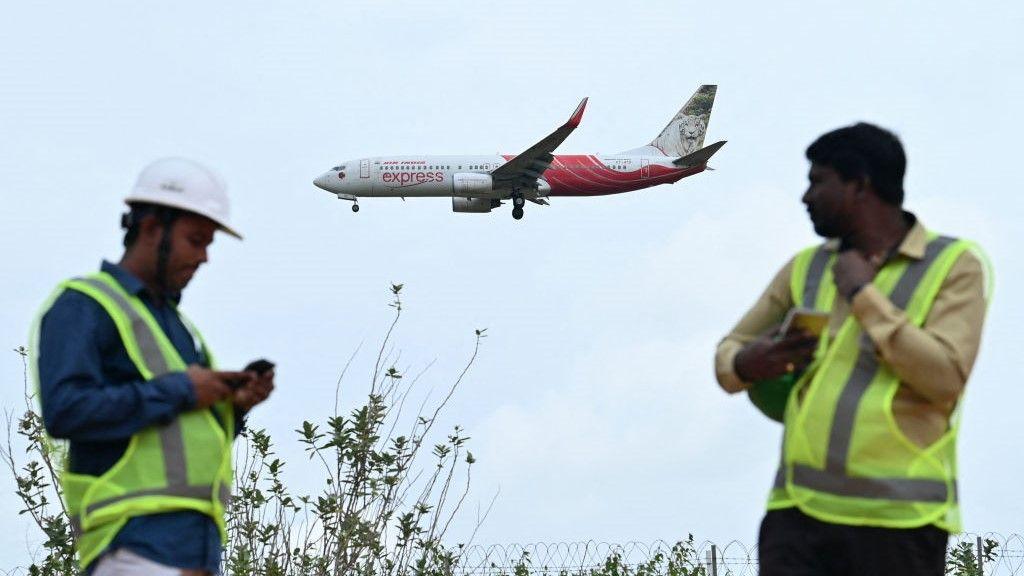An unprecedented and dramatic spike in hoax bomb threats targeting Indian airlines is wreaking havoc on flight schedules, causing aircraft diversions and widespread disruption.
A video posted on social media last week shows wool-clad passengers descending an icy ladder on an Air India plane and walking into the frigid air in the remote Canadian city of Iqaluit. Ta.
The 211 passengers on board the Boeing 777 were originally bound for Chicago from Mumbai, but were diverted in the early morning hours of October 15 due to a bomb threat.
“We have been stranded at the airport since 5am with 200 other passengers… We have no idea what is happening or what to do next… We are completely stranded.” said passenger Harit Sachdeva on social media. He praised the “kind airport staff” and claimed Air India had not provided sufficient information to passengers.
Sahadeva’s post captured the frustration and anxiety of passengers who were transferred to unknown and far-flung destinations. Hours later, a Royal Canadian Air Force plane transported the stranded passengers to Chicago, ending the ordeal. Air India confirmed that the flight was diverted to Iqaluit due to “security threats posted online.”
The threat was false and echoed a number of similar hoaxes targeting Indian airlines so far this year. Last week alone there were at least 30 threats resulting in diversions, cancellations and delays. In June, 41 airports received a hoax email bomb threat in one day, prompting increased security.
Frankfurt-bound Vistara flight diverted to Turkey after bomb threat in September (Getty Images)
By way of background, between 2014 and 2017, authorities recorded 120 bomb hoax alerts at airports, nearly half of which were directed to Delhi and Mumbai, the country’s largest airports. This confirms that such threats have recurred in recent years, but this year’s surge was sensational.
“I am deeply concerned about the recent acts of vandalism targeting Indian airlines, affecting domestic and international operations. Such mischievous and illegal acts are a matter of grave concern. “I condemn attempts to undermine the safety, security and operational integrity of our nation’s aviation sector,” the federal government said. Aviation Minister Kinjarapu Ram Mohan Naidu said:
So what’s going on?
Experts say hoax bomb threats targeting airlines are often related to malice, attention seeking, mental health issues, sabotage of business operations or pranks. In 2018, a series of jokes about bombs made by airline passengers disrupted flight operations in Indonesia. Even flyers have been proven to be the culprit. Last year, a disgruntled passenger at an airport in India’s Bihar state tried to delay a SpiceJet flight by raising a bomb threat.
These rumors are set to wreak havoc on one of the world’s fastest-growing aviation markets. According to the Ministry of Civil Aviation, more than 150 million passengers flew within India last year. More than 3,000 flights depart from and arrive at more than 150 operational airports in the country each day, including 33 international airports.
Misinformation reached its peak last week even as Indian airlines recorded a daily record of 484,263 passengers on October 14th. India has just under 700 commercial airliners in service and a backlog of more than 1,700, said Rob Morris of consultancy Sirium. “All of this definitely makes India the fastest growing commercial aircraft market today,” Morris said.
Bomb threats against airlines are causing inconvenience to passengers, as seen by a traveler on another Vistara flight from Turkey (Getty Images)
Consider the impact of bomb threat warnings on airlines.
If the plane is still in flight, it must be diverted to the nearest airport, like the Air India flight that diverted to Canada last week, or the Vistara flight from Mumbai to Frankfurt that diverted to Turkey in September. It won’t happen. In some cases, fighter jets are scrambled to escort planes reporting threats, as happened with an Air India flight to Heathrow and an Air India Express flight to Singapore over Norfolk last week.
Upon arrival on land, passengers disembark and all baggage, cargo and catering are thoroughly searched. This process can take several hours, and the same crew is often unable to continue flying due to on-duty restrictions. As a result, a replacement crew would have to be arranged, further prolonging the delay.
“All of this has a significant impact on costs and networks. Diverted or delayed flights incur significant costs as landed aircraft become loss-making assets. Delays lead to cancellations and ”The balance will be disrupted,” said Sidarath Kapur, an independent aviation expert.
A dramatic increase in bomb threats from anonymous accounts on social media complicates the task of identifying perpetrators, especially when emails are sent directly to airlines. The motive remains unclear, and it is unclear whether the threat came from a single individual, a group, or just a copycat act.
More than 150 million passengers flew in India last year (Getty Images)
Last week, Indian authorities arrested a 17-year-old school dropout for creating a social media account that made such threats. His motive remains unclear, but he is believed to have targeted four flights, including three international flights, resulting in two delays, one diversion and one cancellation. Investigators suspect some of the posts may have originated from London and Germany after tracking IP addresses.
Obviously, tracking down scammers is a big challenge. Indian law mandates life imprisonment for threats against airport security or service disruption, but that penalty is too harsh for hoax calls and likely won’t stand up to legal scrutiny. According to reports, the government is considering introducing a new law that would put offenders on the no-fly list and potentially punish them with five years in prison.
Ultimately, such false threats can cause serious anxiety among passengers. “My aunt called me and asked if I should take the flight she had booked given these threats. ‘Should I take the train?’ she asked. I told her, ‘Keep flying,'” says the aviation consultant, who requested anonymity. Threats continue to destroy lives and instill fear.
Follow BBC News India on Instagram, YouTube, Twitter and Facebook.

